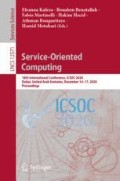Abstract
Retrieval of knowledge from short texts has attracted a lot of attention these days as topic discovery from them can unearth hidden information. In many applications, such topics are needed to be learned on the fly for streaming short texts. In this work we propose an online topic discovery algorithm (OTDA) for short texts. It overcomes the inability of short texts to capture word co-occurrence information by adopting word-context semantic correlation through the skip-gram view of the corpus, following the approach of semantics-assisted NMF (SeaNMF) model due to Shi et al. This OTDA works with one data point or one chunk of data points at a time instead of keeping the entire data in the memory, and also admits the property of memorylessness. We consider a couple of public data sets and an internal data set to conduct experiments using one-pass and multi-pass iterations of the proposed algorithm. The results show encouraging performance of OTDA in terms of average Frobenius loss, Topic Coherence, Normalized Mutual Information (NMI), and emerging topic detection.
S. Das—This work was done when the author was an intern with Optum Global Solutions, Hyderabad during May-June’19.
Access this chapter
Tax calculation will be finalised at checkout
Purchases are for personal use only
Notes
- 1.
- 2.
- 3.
- 4.
- 5.
References
AlSumait, L., Barbará, D., Domeniconi, C.: On-line LDA: adaptive topic models for mining text streams with applications to topic detection and tracking. In: Proceedings of ICDM 2008, pp. 3–12 (2008)
Blei, D.M., Lafferty, J.D.: Dynamic topic models. In: Proceedings of ICML 2006, pp. 113–120 (2006)
Blei, D.M., Ng, A.Y., Jordan, M.I.: Latent Dirichlet allocation. J. Mach. Learn. Res. 3, 993–1022 (2003)
Bottou, L.: Stochastic learning. In: Advanced Lectures on Machine Learning, ML Summer Schools 2003, Canberra, Australia, Revised Lectures, pp. 146–168 (2003)
Bucak, S.S., Gunsel, B.: Incremental subspace learning via non-negative matrix factorization. Pattern Recogn. 42(5), 788–797 (2009)
Cao, B., Shen, D., Sun, J.T., Wang, X., Yang, Q., Chen, Z.: Detect and track latent factors with online nonnegative matrix factorization. In: Proceedings of IJCAI 2007, pp. 2689–2694 (2007)
Cheng, X., Guo, J., Liu, S., Wang, Y., Yan, X.: Learning topics in short texts by non-negative matrix factorization on term correlation matrix. In: Proceedings of the 13th SIAM International Conference on Data Mining 2013, pp. 749–757 (2013)
Guan, N., Tao, D., Luo, Z., Yuan, B.: Online nonnegative matrix factorization with robust stochastic approximation. IEEE Trans. Neural Netw. Learn. Syst. 23(7), 1087–1099 (2012)
Hoffman, M.D., Blei, D.M., Bach, F.R.: Online learning for latent Dirichlet allocation. In: Advances in Neural Information Processing Systems, vol. 23, pp. 856–864 (2010)
Hofmann, T.: Probabilistic latent semantic indexing. In: SIGIR 1999, pp. 50–57. ACM (1999)
Iwata, T., Yamada, T., Sakurai, Y., Ueda, N.: Online multiscale dynamic topic models. In: Proceedings of the 16th ACM SIGKDD International Conference on Knowledge Discovery and Data Mining, pp. 663–672 (2010)
Kim, J., He, Y., Park, H.: Algorithms for nonnegative matrix and tensor factorizations: a unified view based on block coordinate descent framework. J. Global Optim. 58(2), 285–319 (2013). https://doi.org/10.1007/s10898-013-0035-4
Kuang, D., Choo, J., Park, H.: Nonnegative matrix factorization for interactive topic modeling and document clustering. In: Celebi, M.E. (ed.) Partitional Clustering Algorithms, pp. 215–243. Springer, Cham (2015). https://doi.org/10.1007/978-3-319-09259-1_7
Lee, D.D., Seung, H.S.: Algorithms for non-negative matrix factorization. In: Leen, T.K., Dietterich, T.G., Tresp, V. (eds.) Advances in Neural Information Processing Systems, vol. 13, pp. 556–562. MIT Press (2001)
Lin, C.J.: Projected gradient methods for nonnegative matrix factorization. Neural Comput. 19(10), 2756–2779 (2007)
Quan, X., Kit, C., Ge, Y., Pan, S.J.: Short and sparse text topic modeling via self-aggregation. In: Proceedings of IJCAI 2015, pp. 2270–2276. AAAI Press (2015)
Röder, M., Both, A., Hinneburg, A.: Exploring the space of topic coherence measures. In: Proceedings of WSDM 2015, pp. 399–408. ACM (2015)
Sasaki, K., Yoshikawa, T., Furuhashi, T.: Online topic model for twitter considering dynamics of user interests and topic trends. In: Moschitti, A., Pang, B., Daelemans, W. (eds.) Proceedings of EMNLP 2014, pp. 1977–1985. ACL (2014)
Shi, T., Kang, K., Choo, J., Reddy, C.K.: Short-text topic modeling via non-negative matrix factorization enriched with local word-context correlations. In: Proceedings of WWW 2018, pp. 1105–1114 (2018)
Tibshirani, R.: Regression shrinkage and selection via the lasso. J. Roy. Stat. Soc. B 58, 267–288 (1996)
Wang, F., Tan, C., König, A.C., Li, P.: Efficient document clustering via online nonnegative matrix factorizations. In: Eleventh SIAM International Conference on Data Mining. Society for Industrial and Applied Mathematics (2011)
Wang, F., Tan, C., Li, P., König, A.C.: Efficient document clustering via online nonnegative matrix factorizations. In: Proceedings of the 11th SIAM International Conference on Data Mining (SDM), pp. 908–919 (2011)
Wang, X., McCallum, A.: Topics over time: a non-Markov continuous-time model of topical trends. In: Proceedings of the 12th KDD, pp. 424–433. ACM (2006)
Xu, W., Liu, X., Gong, Y.: Document clustering based on non-negative matrix factorization. In: Proceedings of the 26th Annual International ACM SIGIR Conference on Research and Development in Information Retrieval, SIGIR 2003. ACM (2003)
Zhong, S.: Efficient streaming text clustering. Neural Netw. 18(5–6), 790–798 (2005)
Zhou, G., Yang, Z., Xie, S., Yang, J.: Online blind source separation using incremental nonnegative matrix factorization with volume constraint. IEEE Trans. Neural Networks 22(4), 550–560 (2011)
Zuo, Y., Wu, J., Zhang, H., Lin, H., Wang, F., Xu, K., Xiong, H.: Topic modeling of short texts: a pseudo-document view. In: KDD 2016, pp. 2105–2114. ACM (2016)
Author information
Authors and Affiliations
Corresponding author
Editor information
Editors and Affiliations
Rights and permissions
Copyright information
© 2020 Springer Nature Switzerland AG
About this paper
Cite this paper
Roy, S., Malladi, V.V., Sengupta, A., Das, S. (2020). Online Topic Modeling for Short Texts. In: Kafeza, E., Benatallah, B., Martinelli, F., Hacid, H., Bouguettaya, A., Motahari, H. (eds) Service-Oriented Computing. ICSOC 2020. Lecture Notes in Computer Science(), vol 12571. Springer, Cham. https://doi.org/10.1007/978-3-030-65310-1_41
Download citation
DOI: https://doi.org/10.1007/978-3-030-65310-1_41
Published:
Publisher Name: Springer, Cham
Print ISBN: 978-3-030-65309-5
Online ISBN: 978-3-030-65310-1
eBook Packages: Computer ScienceComputer Science (R0)

